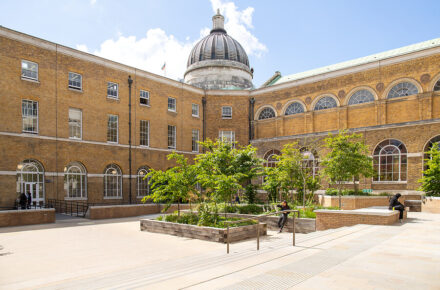

It’s that time of year again when students who don’t have internships for the summer or a grad scheme lined up in something serious like consultancy or finance, are freaking out.
They’ve failed. They’ve come to UCL, got a degree in History or Economics or Education or Mathematics or Natural Sciences, and not got a contract at KPMG or a grad scheme at Goldman Sachs or a training something at McKinsey. What hope is there of success in life, of living a good life, or a happy life, a life they can look back on and think “Damn, you son of a bitch, you did it.”
Let’s take Billy: he’s come to UCL to study English Literature or Politics or Philosophy or Maths, to get a great education. He heard somewhere (not from the plastered writing all over campus) that UCL is a top ten global university. He expects to learn. He’s young, enthusiastic, and he’s got that first-year worldliness to him. He’s passion-driven.
But from that first moment of arrival on campus, he’s confronted with a competitive atmosphere on campus verging on monomania. Just a few weeks in, when Billy anticipated engaging with his peers and professors about his favourite books, philosophers, and problem sets, his thoughts turned to getting a real job.
To placate this inner urge, Billy spends a month in the first term applying to spring weeks in everything that’s real – finance, consultancy, banking et al. Flashforward to second year, and he’s allocated most of the first term to applying for summer internships. In fact, no one’s seen him since September. He’s “locked in”, really “sending it”. He hasn’t left his room for weeks, or washed, or seen anyone. He’s completely forgotten where campus is, but that doesn’t matter. His flatmates are beginning to wonder why they ever chose to live with him. That’s a lie – they’re too busy doing the same. “But alas,” they thought, “we’ll be out of this in December when most of the deadlines have passed.”
What Billy and his pals, and so many of us, are doing is treating university as a means to an end from the moment we arrive. So many of us are missing out on being a student, reducing our degrees and university experience, and with it everything we can create and cultivate, pushing our unique academic, artistic, and non-work-related interests to the periphery. In this way, rather than being a place that diversifies interests, university increasingly homogenises them.
Billy’s life improves in December: he’s washed, he’s spending time with his friends again and going to his first lectures since March last year. Yet behind this seemingly happier façade, Billy’s thoughts are still whelmed in his internship applications. “Surely… 134 applications, at least give me one interview.”
But then January comes round and he’s heard nothing. The nagging thoughts increase. February there’s and he’s starting to sweat. “Any day now,” he said. Then, just as the days get longer and London’s winter begins to shed the grey and dark for better days – the days which make you realise why London is good – he starts to panic.
“No, I’m good, I’m happy, I’m doing well, this doesn’t really matter, it’s only an internship, I’m happy.”
A few moments later…
“Without an internship, I’ll be finished, I won’t get a job because I’ll have nothing good on my CV, and without that, I’m finished.”
Then…
“Shut up, shut up, for fuck’s sake Billy, what the fuck are you doing?”
Billy’s internal discourse repeats again and again, until the remainder of the last teaching term is spent actively trying to quieten your unforgiving self-disdain.
We’ve all faced the desperation, disappointment or rabid self-questioning that comes with applying yourself to little or no outcome.
We are trying to make sure we aren’t the ones on the eve of graduation without any clue what to do, to ameliorate the “soul-destroying” job hunt that ensues post-graduation.
Billy’s only in his second year. Next year, he’s doing it all again, but it’s worse. More hours spent on abject splintering of indifferent applications and neurotic refreshing of application portals. With the immediacy of real life pressing against him and all the uncertainty that comes with stepping beyond the cavernous arena of university, Billy seldom thinks about his degree or university life.
At some point, Billy might reflect on what he’s doing; the endless hours he’s committing to something he really isn’t too fussed about. He might even become wary of how little time he’s giving to his degree – the real reason he’s at university (honestly, who knows why anyone goes to university anymore?) But for many of us, this reflection doesn’t happen at all, or it happens too late.
Obviously, Billy’s story is entirely made up – I’ve never even met someone at UCL called Billy. But if it does resonate with you, doesn’t that make this thing all the more real for personifying a dilemma that many of us confront at some point as undergraduates?
The saddest thing about Billy’s story isn’t that he’s spent so long applying for internships, grad schemes and jobs with little success, nor is it the fact that he’s neglected his university experience. It’s the fact that Billy is losing out on doing what he loves, what he cares about, at a time he really could (should) be pushing, challenging, trying, trialling his interests.
Far too many of us spend too much time and energy stressing about the next thing, the next grad scheme, the next internship, the next job. For many of us this starts in first year, others the pressure dawns on them in second year, and for the lucky or unfortunate few, it’s only in third year that thoughts about getting a real job in the real world spring to the fore.
Of course, many students spend their time applying for these opportunities because that is what they genuinely like, and though it’s not my ideal job, I can get behind someone spending ALL that time as an undergraduate if it’s genuinely what they want to do. But for many of us I don’t think that’s the case. I simply do not believe that 21% (35% of social sciences and humanities students) of UCL undergraduates are destined to work in Accountancy and financial services. Indeed, the four largest employers of UCL students are– Deloitte, EY, PwC and KPMG – ring any bells? I’d be willing to bet a lot of money that they do…
But to me, Billy’s story also highlights some significant questions about the way students at UCL experience university (and I’m sure other higher education institutions). It begs the question about what university is for. Obviously, a lot of it is dependent on the individual, but I think there are some universal reasons that, beyond their application in professional contexts, I feel like we have lost sight of.
University is meant to be a place that challenges us (remember UCL’s mantra is “disruptive thinking”), a place to try the novel, a platform to practice your interests in the world, and for some of us (hopefully a majority), perhaps it should constitute an intellectual journey. At UCL, you’d think you’d find it easy to do that.
Yet, when so many of us are applying for the same internships, grad schemes and jobs, you might begin to view university as a factory that streamlines us into a common mould rather than a medium for individual growth. What use is a university if students leave further away from knowing what they truly want to do than when they joined? Perhaps that’s why we students settle. We’ve come to university looking to develop an interest, only to spend no time cultivating it. So, eventually, we get marched along with many of our peers into thinking an internship at Goldman Sachs, EY, or Barclays is going to do that for us. Of course, some people do enjoy that sort of thing, and people who need to do that, but for many of us, it’s simply the thing that we think we should do.
This isn’t supposed to be a warning or a gesture for self-reflection or a mocking of some of these vocations – John Oliver does a far better job at that than I ever will. What I’m trying to get at is why so many of us spend so much of our university experience applying for jobs in finance or consultancy. It’s not that I think these jobs are morally reprehensible pursuits; in fact, I’m sure some of these jobs are necessary. It’s just that I simply won’t believe that most students doing this feel they are producing something, helping people, or engaging with something they are explicitly passionate about. Of course, I can’t know people’s motivation, but the number of times I’ve heard “selling out” or “sell my soul” or “settle for” in the last three years must (surely) speak to something.
Obviously, hypothetical Billy might need money. He might have parents he needs to take care of, university loans to pay off, or at the very least be able to afford to live in London. He thinks that if he works a real job, these things will take care of themselves. In fact, these real jobs might actually make a lot of sense for people who need to make money quickly. For others, they may only intend to work there for two to three years before moving on to something else.
Yet, in researching for this article, I came across many student articles on very similar topics, from places not too dissimilar to UCL – Yale, Harvard, UPenn.
Shockingly, this debate has been picked up by Ivy’s where more than one in two graduates now go into tech, consultancy or finance.
There were far fewer articles from UK university students – this might be because the effects of corporate capture are less pronounced. It may perhaps be down to the fact that student journalism is less of a religion here, and more of a fun side quest for the bored or (select few) aspiring journalists. Perhaps the absence of this sort of article is a result of, god forbid, the extent of corporate capture in elite UK universities pushing students away from wanting to write about this topic.
One article I found, written by Marina Keegan at Yale in 2011, in an essay titled “Even Artichokes Have Doubts”, touched on these ideas so gracefully:
“For most students, however, I genuinely don’t think it’s about the money. It’s a factor, sure. But it just feels like a factor.
What bothers me is this idea of validation, of rationalisation. The notion that some of us (regardless of what we tell ourselves) are doing this because we’re not sure what else to do and it’s easy to apply to and it will pay us decently and it will make us feel like we’re still successful. I just haven’t met that many people who sound genuinely excited about these jobs. That’s super depressing! I don’t understand why no one is talking about it.”
Marina died in a car accident a few days after she graduated, and was due to start writing for The New Yorker that same year. Her legacy is the soft-spoken, willing voice in her writing that touched a generation of students and encouraged us to think more about what we could be, rather than what we should be. Marina’s article triggered a wave of response, was viewed over a million times and was republished in the New York Times. It went on to inspire many other students (including myself) to put their thoughts to paper. Her impact was so widespread that even last December, a homage to her essay appeared in this Economist article. The piece spoke about how this phenomenon manifested as a:
“Pervasive process of acculturation, one that slowly reshapes many students’ worthy ambitions to make a difference, ill-defined and unrealistic though they may be, into a plan to get a management-consulting internship……More than before, life on campus feels like a fast track to the corporate world.”
It’s little surprise then that for many universities, UCL included, so many graduates are increasingly going into these fields, it’s sewn into them from the minute they get to university.
You could be passionate about human rights law but settle for corporate law. You could love and be a brilliant social worker, but settle for private equity. You could be an aspiring doctor, like one med student called Jose I spoke to in first year, but in lieu of an incredibly marketable degree from UCL in medicine you realise it would be stupid, foolish, ignorant, whatever of you to not take the 90k salary from Blackstone over the 30k you’d get as a junior doctor trying to pay off your student loan (Even if, like Jose, you are called by the vocation).
The problem isn’t just consultancy, finance or technology monopolising talent. The problem is that students are being out-competed from doing what they intended to do by coming to university. Because it’s financially impossible to be a student. Because it’s risky pursuing the less accessible, the less stable. Because your friends are all doing something similar. And maybe one day it will bring you closer to being respected, to being successful, to being happy.
It may do. Yet the paradox is, in thinking this path will provide more stability and demand less sacrifice, you risk sacrificing the very thing you care for, perhaps even the reason why you decided to go to university in the first place.








